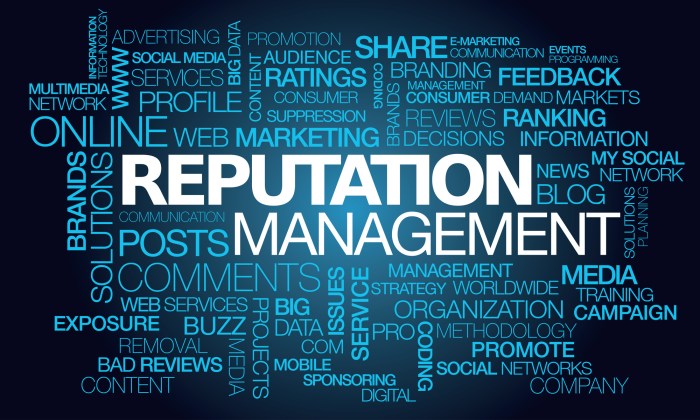Online Reputation Management sets the stage for controlling how you are perceived in the digital world. From shaping a positive online presence to addressing negative feedback, this practice is crucial for individuals and businesses alike.
In today’s interconnected society, what people see online can make or break reputations, making it essential to understand and manage your online image effectively.
Overview of Online Reputation Management

Online Reputation Management (ORM) involves monitoring, addressing, and influencing what is being said about a person, brand, or business online. It aims to maintain a positive online presence and counteract any negative content that may harm reputation.
The importance of managing online reputation cannot be overstated in today’s digital age. With the widespread use of the internet and social media, information spreads rapidly and can have a significant impact on the perception of a business or individual. Negative reviews, comments, or news articles can damage credibility, trust, and ultimately affect sales or opportunities.
Examples of How Online Reputation Can Impact Businesses or Individuals
- Businesses: A restaurant receiving multiple negative reviews on platforms like Yelp or Google can deter potential customers from dining there, leading to a decline in revenue.
- Individuals: Job seekers with a history of unprofessional behavior documented on social media may find it challenging to secure employment as employers often conduct online research on candidates.
- Brands: Companies like United Airlines faced a public relations crisis when a video of a passenger being forcibly removed from a flight went viral, resulting in widespread backlash and damage to their reputation.
Strategies for Online Reputation Management

When it comes to managing your online reputation, there are a variety of strategies you can use to build and maintain a positive image in the digital world. From proactive measures to reactive responses, it’s important to have a plan in place to protect your online reputation.
Proactive Strategies for Building a Positive Online Reputation
- Create and regularly update your social media profiles to showcase a positive image of your brand or yourself.
- Engage with your audience by responding to comments and messages in a timely and professional manner.
- Produce high-quality content that adds value to your audience and showcases your expertise in your field.
- Monitor your online presence regularly to stay ahead of any potential issues or negative feedback.
- Encourage satisfied customers to leave positive reviews and testimonials to boost your credibility.
Reactive Strategies for Handling Negative Online Feedback
- Respond to negative feedback promptly and address the issue with a sincere and empathetic tone.
- Take the conversation offline if necessary to resolve the issue privately and prevent further public backlash.
- Apologize for any mistakes or misunderstandings and offer solutions to make things right with the unhappy customer.
- Monitor the situation closely and follow up to ensure that the issue has been resolved to the customer’s satisfaction.
Tips on Monitoring and Maintaining Online Reputation
- Set up Google Alerts to receive notifications whenever your brand or name is mentioned online.
- Use online reputation management tools to track and analyze your online presence and sentiment.
- Regularly audit your online profiles and content to ensure they accurately reflect your brand image.
- Stay active on social media and engage with your audience to build trust and credibility.
- Seek professional help from online reputation management experts if you need assistance in maintaining a positive online image.
Tools and Platforms for Online Reputation Management
Online reputation management tools and platforms are crucial for businesses to monitor, track, and maintain a positive online presence. These tools help in understanding customer feedback, managing reviews, and addressing any negative comments effectively.
Popular Tools for Monitoring Online Reputation
- Google Alerts: Sends notifications when a business is mentioned online.
- Reputology: Focuses on review monitoring and management for businesses.
- Hootsuite: Allows for social media monitoring and engagement.
Comparison of Different Online Reputation Management Tools
| Tool | Features |
|---|---|
| Google Alerts | Basic monitoring of online mentions |
| Reputology | Detailed review tracking and analysis |
| Hootsuite | Social media monitoring and engagement |
Leveraging Social Media Platforms for Managing Reputation, Online Reputation Management
Social media platforms like Facebook, Twitter, and Instagram play a significant role in shaping a business’s online reputation. By actively engaging with customers, responding to queries and feedback, and sharing valuable content, businesses can enhance their reputation and build trust among their audience.
Case Studies on Online Reputation Management
Online reputation management is crucial for businesses and individuals to maintain a positive image in the digital world. Let’s dive into some case studies that showcase the impact of effective and ineffective reputation management strategies.
Successful Online Reputation Management Case Study
- In 2017, United Airlines faced a major PR crisis when a video of a passenger being forcibly removed from one of their flights went viral. The airline quickly responded by issuing a public apology, taking full responsibility for the incident, and implementing new customer service policies. They also actively engaged with customers on social media to address concerns and rebuild trust. As a result, United Airlines was able to salvage their reputation and regain the trust of their customers.
Poor Online Reputation Management Scenario
- In 2018, Facebook came under fire for the Cambridge Analytica data scandal, where the personal information of millions of users was harvested without their consent. The social media giant initially downplayed the incident and failed to take immediate action to address the breach. As a result, Facebook faced intense scrutiny from users, regulators, and the media, leading to a significant drop in user trust and a decline in stock value.
Real-world Examples of Online Reputation Crises and Resolutions
- In 2019, Starbucks faced backlash after two black men were wrongfully arrested at one of their stores. The coffee chain responded by issuing a public apology, closing all stores for a day of racial bias training, and implementing new policies to prevent similar incidents. Starbucks also engaged with the community and partnered with civil rights organizations to address racial inequality. These actions helped Starbucks rebuild their reputation and demonstrate their commitment to diversity and inclusion.
